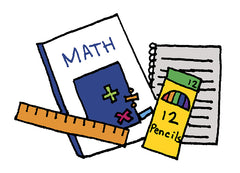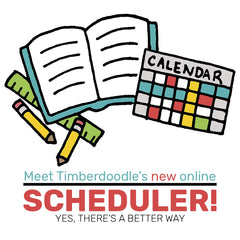Today’s Q & A addresses our favorite assessments, courses, and questions to utilize in helping a student come up to speed on language arts. What would you add?
Hope: Someone wrote in and said, “We kind of dropped the ball with my 11th grader on his spelling, writing, and reading skills. What do we do? How do we help bring him up to grade level on that?” What are your thoughts?
Deb: Well, it’s unfortunate we’re not dialoguing back and forth because it would be very helpful for me to know some of the background. Have you used anything? Have you tried programs and they have not worked for you? Is there a reason for the delay? Is there dyslexia? There are a lot of holes in this. We’re kind of floundering to figure it out.
Hope: Or is it just that it’s not something you focused on at all and it’s just been ignored? So maybe there’s no physical reason. It’s just an issue of we just never hit it.
Deb: Exactly. Here at Timberdoodle we get questions from all walks of life. If you have adopted a child when they were 14 years old… A lot of different things could be at play here and we don’t know. But where I would start first of all is testing. So test your child. Go to our site and look at Spelling You See. Take their test and see where he falls in that. If he can test out of all the Spelling You See tests well enough that he doesn’t need to do Spelling You See, as far as I’m concerned that’s okay. Tick that one off. If not, then plug them into the appropriate one and start working on it. It’s an easy enough program that you could zip through. You don’t have to just do one a day. You can try to fast forward through the whole program. So I would go with that.
For grammar, I would go with Easy Grammar Plus. It’s designed specifically for that. So you would cover everything in grammar in a year, easy peasy.
Reading is going to be hard. Again, I don’t know what we’re working with. Are we talking about a child who knows how to read but hates it? Or a child who doesn’t know how to read? It might behoove you to take the All About Reading placement test to see. Yes, he can read at at the appropriate level or no, he cannot. If he cannot, he may feel silly using All About Reading fourth grade level, but better to feel silly and master it than to never master it. Reading is pretty important.
However, if you have a child who does know how to read but hates it, that’s probably going have something to do with what he’s reading. So find out what he wants to read. My son would light up for any firefighter magazine. Even when he was eight, we subscribed to a firefighter magazine and he would read that. He wouldn’t read things that his sister read but he would read that. For this particular boy it might be skateboarding. It could be farming. It could be aerodynamics. I don’t know. But find out what his passion is and just flood him with books and trade magazines and anything else that would deal with that topic.
Hope: And if he’s not ever going to be a reader, I think that that’s an acceptable answer, too. He knows how to read we’ve tested for that. He is capable of reading. He doesn’t enjoy it and that’s okay. But if he can’t read then you’re going to want to see if you can help him out with that and get him up to grade level and to ability.
Deb: Right. Another thing that we talked previously about is there’s some advantage to having a familiarity with some of the classic literature. You may hear it mentioned in a sermon or in a speech or whatever, and he will feel more comfortable in those kind of settings if he knows the reference. So if you have a child who hates to read or cannot read and you still want to give them some taste of the classic literature audiobooks are a great way to go.
Hope: Have him listen to an audiobook and then he’ll have at least exposure to it and be somewhat familiar with it. That’s a great way to go.
If his not being at grade level is not due to lack of exposure, but just because he struggles more, due to dyslexia or whatever, there are other things that we can recommend. If you want to email us specifics we can direct you towards some resources, such as Touch-Type, Read, and Spell, which is a typing program that assists with spelling and reading, and is specifically helpful for the dyslexic student. If there are specific reasons that he’s not up at grade level that you know of, then we are happy to consult with you and say, “Hey, we think this product will assist him best.”
The other area we didn’t hit would be composition. What would you recommend for that?
Deb: For that I recommend Jump In. It’s a great program. It’s in our fifth grade program, but it can be used for whatever age. You, as a parent, would look at the work that the child turned out and would say them, “You didn’t give your best effort…” or, “You did!” It’s one that has the most flexibility to the program and yet accomplishes what you’re trying to do.
Hope: That would be for the religious perspective. If you’re coming from a non-religious perspective probably something like Wordsmith Craftsman or Wordsmith Student would be more along the lines of what you’re looking for.
Again, if you have some specifics that you think would be helpful for us to know and help us to better answer this question we’re always happy to take your questions at mailbag@timberdoodle.com and work with you and see if we can help you tailor a program that would specifically address what your child’s concerns are.
Deb: You can’t give us too much information!
Hope: No, you can’t. Thank you!
 Skip to content
Skip to content





